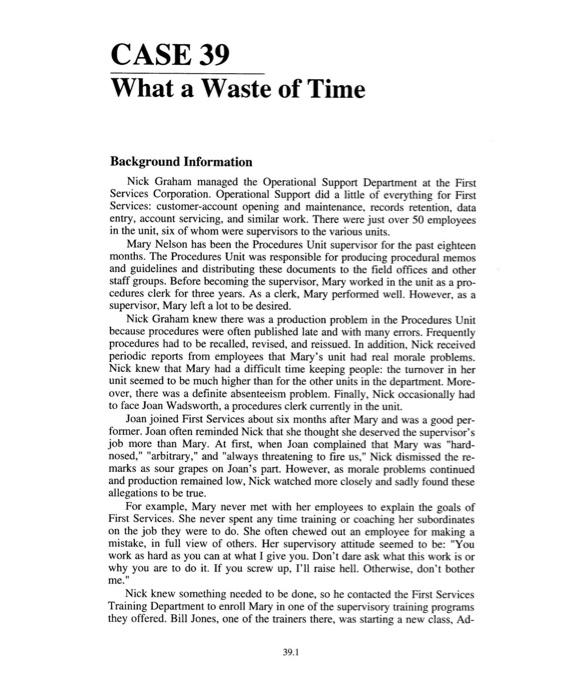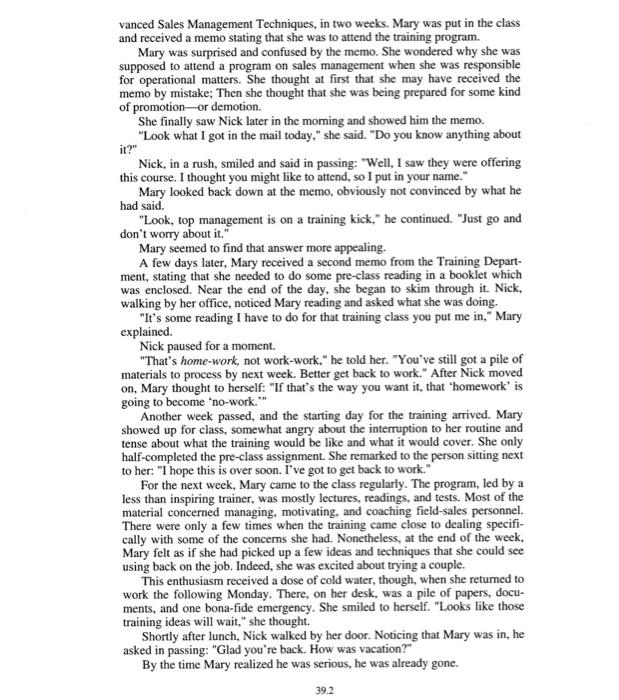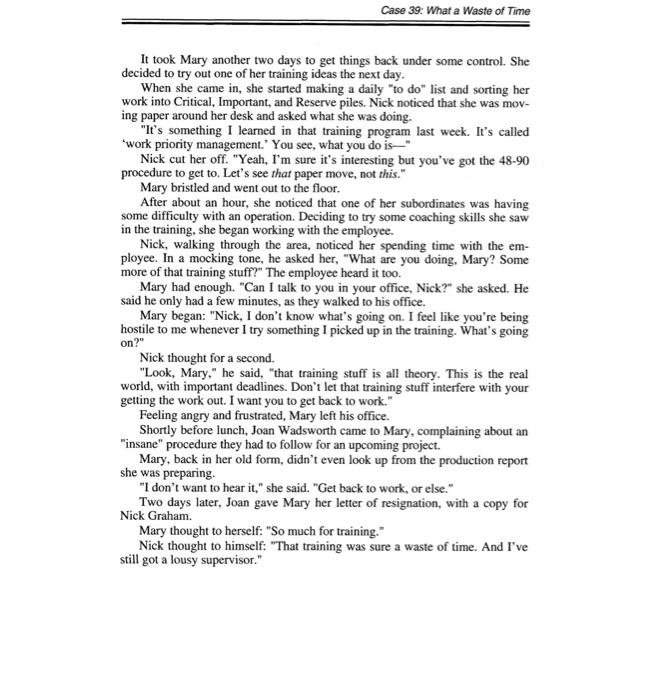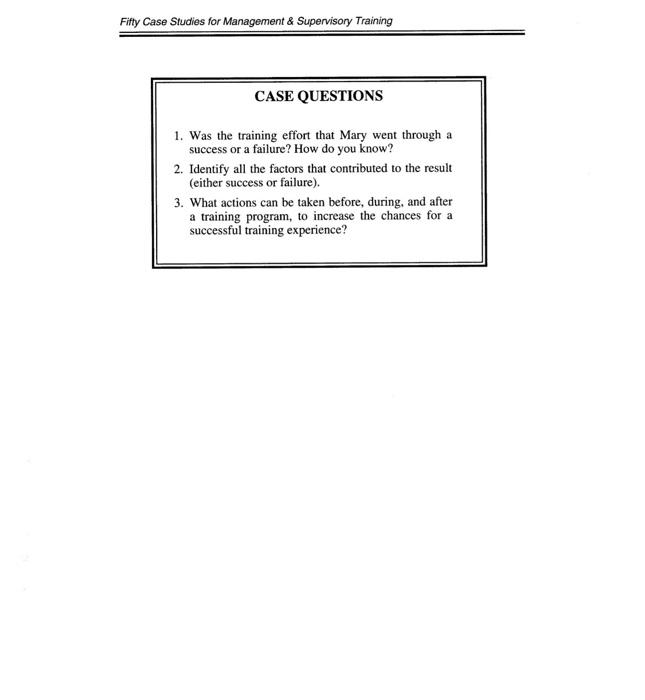NO short answer please

Background Information Nick Graham managed the Operational Support Department at the First Services Corporation. Operational Support did a little of everything for First Services: customer-account opening and maintenance, records retention, data entry, account servicing, and similar work. There were just over 50 employees in the unit, six of whom were supervisors to the various units. Mary Nelson has been the Procedures Unit supervisor for the past eighteen months. The Procedures Unit was responsible for producing procedural memos and guidelines and distributing these documents to the field offices and other staff groups. Before becoming the supervisor, Mary worked in the unit as a procedures clerk for three years. As a clerk, Mary performed well. However, as a supervisor, Mary left a lot to be desired. Nick Graham knew there was a production problem in the Procedures Unit because procedures were often published late and with many errors. Frequently procedures had to be recalled, revised, and reissued. In addition. Nick received periodic reports from employees that Mary's unit had real morale problems. Nick knew that Mary had a difficult time keeping people: the turnover in her unit seemed to be much higher than for the other units in the department. Moreover, there was a definite absenteeism problem. Finally, Nick occasionally had to face Joan Wadsworth, a procedures clerk currently in the unit. Joan joined First Services about six months after Mary and was a good performer. Joan often reminded Nick that she thought she deserved the supervisor's job more than Mary. At first, when Joan complained that Mary was "hardnosed," "arbitrary," and "always threatening to fire us," Nick dismissed the remarks as sour grapes on Joan's part. However, as morale problems continued and production remained low, Nick watched more closely and sadly found these allegations to be true. For example, Mary never met with her employees to explain the goals of First Services. She never spent any time training or coaching her subordinates on the job they were to do. She often chewed out an employee for making a mistake, in full view of others. Her supervisory attitude seemed to be: "You work as hard as you can at what I give you. Don't dare ask what this work is or why you are to do it. If you screw up, I'll raise hell. Otherwise, don't bother me." Nick knew something needed to be done, so he contacted the First Services Training Department to enroll Mary in one of the supervisory training programs they offered. Bill Jones, one of the trainers there, was starting a new class, Ad- vanced Sales Management Techniques, in two weeks. Mary was put in the class and received a memo stating that she was to attend the training program. Mary was surprised and confused by the memo. She wondered why she was supposed to attend a program on sales management when she was responsible for operational matters. She thought at first that she may have received the memo by mistake; Then she thought that she was being prepared for some kind of promotion-or demotion. She finally saw Nick later in the moming and showed him the memo. "Look what I got in the mail today," she said. "Do you know anything about it?" Nick, in a rush, smiled and said in passing: "Well, I saw they were offering this course. I thought you might like to attend, so I put in your name." Mary looked back down at the memo, obviously not convinced by what he had said. "Look, top management is on a training kick," he continued. "Just go and don't worry about it." Mary seemed to find that answer more appealing. A few days later, Mary received a second memo from the Training Department, stating that she needed to do some pre-class reading in a booklet which was enclosed. Near the end of the day, she began to skim through it. Nick, walking by her office, noticed Mary reading and asked what she was doing. "It's some reading I have to do for that training class you put me in," Mary explained. Nick paused for a moment. "That's home-work, not work-work," he told her. "You've still got a pile of materials to process by next week. Better get back to work." After Nick moved on. Mary thought to herself: "If that's the way you want it, that 'homework' is going to become "no-work." Another week passed, and the starting day for the training arrived. Mary showed up for class, somewhat angry about the interruption to her routine and tense about what the training would be like and what it would cover. She only half-completed the pre-class assignment. She remarked to the person sitting next to her: "I hope this is over soon. Ive got to get back to work." For the next week, Mary came to the class regularly. The program, led by a less than inspiring trainer, was mostly lectures, readings, and tests. Most of the material concerned managing, motivating, and coaching field-sales personnel. There were only a few times when the training came close to dealing specifically with some of the concerns she had. Nonetheless, at the end of the week, Mary felt as if she had picked up a few ideas and techniques that she could see using back on the job. Indeed, she was excited about trying a couple. This enthusiasm received a dose of cold water, though, when she returned to work the following Monday. There, on her desk, was a pile of papers, documents, and one bona-fide emergency. She smiled to herself. "Looks like those training ideas will wait," she thought. Shortly after lunch, Nick walked by her door. Noticing that Mary was in, he asked in passing: "Glad you're back. How was vacation?" By the time Mary realized he was serious, he was already gone. 39.2 It took Mary another two days to get things back under some control. She decided to try out one of her training ideas the next day. When she came in, she started making a daily "to do" list and sorting her work into Critical, Important, and Reserve piles. Nick noticed that she was moving paper around her desk and asked what she was doing. "It's something I learned in that training program last week. It's called 'work priority management.' You see, what you do is-" Nick cut her off. "Yeah, I'm sure it's interesting but you've got the 48-90 procedure to get to. Let's see that paper move, not this." Mary bristled and went out to the floor. After about an hour, she noticed that one of her subordinates was having some difficulty with an operation. Deciding to try some coaching skills she saw in the training, she began working with the employee. Nick, walking through the area, noticed her spending time with the employee. In a mocking tone, he asked her, "What are you doing, Mary? Some more of that training stuff?" The employee heard it too. Mary had enough. "Can I talk to you in your office, Nick?" she asked. He said he only had a few minutes, as they walked to his office. Mary began: "Nick, I don't know what's going on. I feel like you're being hostile to me whenever I try something I picked up in the training. What's going on?" Nick thought for a second. "Look, Mary," he said, "that training stuff is all theory. This is the real world, with important deadlines. Don't let that training stuff interfere with your getting the work out. I want you to get back to work." Feeling angry and frustrated, Mary left his office. Shortly before lunch, Joan Wadsworth came to Mary, complaining about an "insane" procedure they had to follow for an upcoming project. Mary, back in her old form, didn't even look up from the production report she was preparing. "I don't want to hear it," she said. "Get back to work, or else." Two days later, Joan gave Mary her letter of resignation, with a copy for Nick Graham. Mary thought to herself: "So much for training." Nick thought to himself: "That training was sure a waste of time. And Pve still got a lousy supervisor." CASE QUESTIONS 1. Was the training effort that Mary went through a success or a failure? How do you know? 2. Identify all the factors that contributed to the result (either success or failure). 3. What actions can be taken before, during, and after a training program, to increase the chances for a successful training experience











